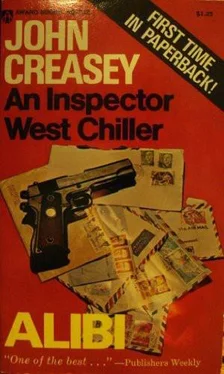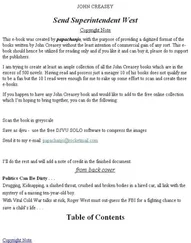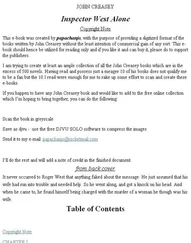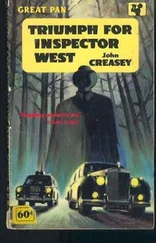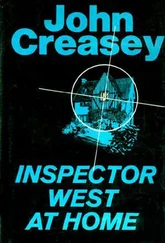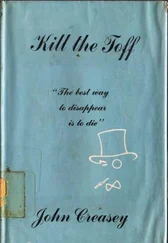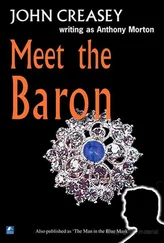John Creasey - Alibi
Здесь есть возможность читать онлайн «John Creasey - Alibi» весь текст электронной книги совершенно бесплатно (целиком полную версию без сокращений). В некоторых случаях можно слушать аудио, скачать через торрент в формате fb2 и присутствует краткое содержание. Жанр: Старинная литература, на русском языке. Описание произведения, (предисловие) а так же отзывы посетителей доступны на портале библиотеки ЛибКат.
- Название:Alibi
- Автор:
- Жанр:
- Год:неизвестен
- ISBN:нет данных
- Рейтинг книги:4 / 5. Голосов: 1
-
Избранное:Добавить в избранное
- Отзывы:
-
Ваша оценка:
- 80
- 1
- 2
- 3
- 4
- 5
Alibi: краткое содержание, описание и аннотация
Предлагаем к чтению аннотацию, описание, краткое содержание или предисловие (зависит от того, что написал сам автор книги «Alibi»). Если вы не нашли необходимую информацию о книге — напишите в комментариях, мы постараемся отыскать её.
Alibi — читать онлайн бесплатно полную книгу (весь текст) целиком
Ниже представлен текст книги, разбитый по страницам. Система сохранения места последней прочитанной страницы, позволяет с удобством читать онлайн бесплатно книгу «Alibi», без необходимости каждый раз заново искать на чём Вы остановились. Поставьте закладку, и сможете в любой момент перейти на страницу, на которой закончили чтение.
Интервал:
Закладка:
“What do you intend doing now?” he asked.
“Well, sir, I’d like to check on who else was supposed to be participating in the fun and games at Maisie Dun- ster’s apartment. I tried this afternoon, in fact, but no one was home. The apartment is in an old house converted into flats or flatlets, and all the tenants seem to work. They were out, anyway. Then I tried to get a line on Rachel Warrender’s recent activities, but drew a blank. Her father is the Member of Parliament and the firm of Warrender, Clansel and Warrender is a very old and reputable one. None of the partners was in and none of the clerks would talk about the girl. I also tried to get a line on Rapelli’s recent movements, and again drew a blank. He says he’s a translator for magazines and publishers of English into Italian and vice versa, but nothing much has turned up about him. I can’t yet prove he’s involved in drugs.” Roger gave a short, rueful grimace. “And when I started out this morning I thought we might really have a line on the drug business, while the case against Rapelli seemed cut and dried. It wasn’t until Rachel Warrender came to see me and threatened to produce her witnesses for Rapelli that things began to misfire.”
Coppell’s eyes rounded.
“She did what?”
“Only half an hour before Rapelli was due in the dock. I went over to the court as soon as I could and arrived just in time. I wanted to make sure Leeminster wasn’t on his own when she arrived. If there was going to be trouble, I wanted to be in the middle of it.”
“You certainly are that,” growled Coppell. “Where are the defence witnesses now?”
“Division is checking up on them,” answered Roger, and I expect word any time.” When Coppell didn’t speak, he went on, “It’s a peculiar case in every way. Ricardo Verdi and some friends were at a small private club, where they have so-called musical evenings—a record club, I gather, with some instrument playing. Division now says there’s no evidence of pot or of anything erotic —the members like off-beat music and go there to enjoy it. Something happened between Rapelli and Verdi and Rapelli struck Verdi over the head with an electric guitar.”
Coppell echoed, “A guitar?”
“A heavy, ornamental one,” confirmed Roger. “I went to see him this afternoon—he’s at the Hampstead Cottage Hospital. The surgeon said that he—Verdi—has an exceptionally thin skull. There is some brain damage and some haemorrhage.”
“What are his chances?” demanded Coppell.
“No more than fifty-fifty,” Roger answered.
“So it might turn out to be a murder charge,” Coppell remarked. “Handsome, if Rapelli did do this job, then we want absolute proof. Absolute, understand. And we won’t have it until you break this alibi, and that means proving that three people are lying. And if they are lying —why? Give me one good reason.”
“To save Rapelli from being convicted,” Roger answered flatly. “Well, if they are lying then I’ll soon find out.”
Coppell frowned.
“You’ve got just seven days.”
“It ought to be enough.”
“If you can’t produce positive evidence that the alibi is phoney by the second hearing, the case will probably be dismissed,” Coppell said, “and that won’t do you any good.”
Until that moment, Roger had been prepared to let the situation ease away, but suddenly anger flared up in him again. There was something very close to a threat, certainly a sneer, in Coppell’s manner and words. He had swung back to his unreasonable, almost bullying manner, and if Roger let it pass then he would always be at Coppell’s mercy. So he schooled himself to ask calmly, “It wouldn’t do me any great harm, surely?”
“Like hell it wouldn’t!”
“I hate to remind you,” said Roger, icily now, “that of the crimes brought to the Yard’s notice in the past four years, over fifty per cent have remained unsolved. Yet barely twenty per cent of those I’ve personally investigated have been unsolved. Aren’t I allowed a failure without being covertly threatened with disciplinary action?”
Coppell turned a dusky turkey-red.
“You’re being bloody-minded,” he rasped. “You may not have a high opinion of me or the Yard’s performance while I’ve been commander, but let me tell you that a lot of people do have a high opinion of me. And you’re the only senior officer around from whom we’ve had any bad publicity.” He clenched his fist and banged it on the folded copy of the Globe. “And that’s the worst kind of publicity.”
He turned on his heel, and strode out; the door slammed behind him.
Roger did not move for some minutes, just sat there like a statue, his face the colour of white marble. His features were set, his full lips drawn very tight, his eyes narrowed beneath the well-shaped brows.
He was not conscious of thought; barely, of feeling. He felt cold, and once or twice a quiver ran through his whole body. A phrase from childhood was the first thought that came into his mind: as if someone were walking over my grave. Slowly, he forced himself to relax, and getting up, he went to the window and looked out at the complex of modern buildings. It was overcast and there was a spit of rain in the air. He opened the window and although the air was cold and damp, he was glad of it. He needed fresh air.
It was several minutes before he went back to the desk, sat down and pulled the Globe towards him. On the front page was the story of a right-wing rally at the Albert Hall, addressed by George Entwhistle, the anti- immigrant M.P., and Sir Roland Warrender, but he did not read these, apart from the headlines. He turned to the article that had so upset Coppell, and read every word closely. A change came over him. This article was slanted—slanted against him and against the police- even to some degree, against the magistrate. One phrase read:
Since when, in British courts, have the police been authorised to speak except under oath?
Another ran:
Chief Superintendent West is one of the Yard ’ s most experienced officers. He has a good reputation as a resourceful and often courageous man. What therefore induced him not only to commit such contempt of court but also to imply—as undoubtedly he did imply —that there was some kind of sex orgy taking place at the flat of the young woman who had just given evidence in defence of the accused? We do not like to believe that such a highly placed officer desired to discredit a witness, but the consequence of his remark: “ As a point of interest, Miss Dunster , were, the other two witnesses in your bed at the same time? ”. . .
Roger read on, slowly.
There were no paragraphs which he could lift out as being, in fact, defamatory, but the whole tenor of the article was critical of the police in general as well as of his handling of this case in particular. At last, he put the paper aside. He had a pressure headache behind the eyes, and a heavy feeling of depression in his breast, like a physical weight. By chance, the paper closed to the front page, and he saw the Entwhistle and Warrender speeches. There was a lead-in by the Globe political correspondent.
Compared with Sir Roland, Mr. Entwhistle ’ s speech was pure Liberalism, all honey and tolerance. Sir Roland, on the other hand, called again for a Businessman ’ s Government—and government by decree. There is much in what he says . . .
The ringing of the telephone made Roger start; he let it ring again, picked it up and then announced, “West,” in a very quiet voice.
Читать дальшеИнтервал:
Закладка:
Похожие книги на «Alibi»
Представляем Вашему вниманию похожие книги на «Alibi» списком для выбора. Мы отобрали схожую по названию и смыслу литературу в надежде предоставить читателям больше вариантов отыскать новые, интересные, ещё непрочитанные произведения.
Обсуждение, отзывы о книге «Alibi» и просто собственные мнения читателей. Оставьте ваши комментарии, напишите, что Вы думаете о произведении, его смысле или главных героях. Укажите что конкретно понравилось, а что нет, и почему Вы так считаете.
